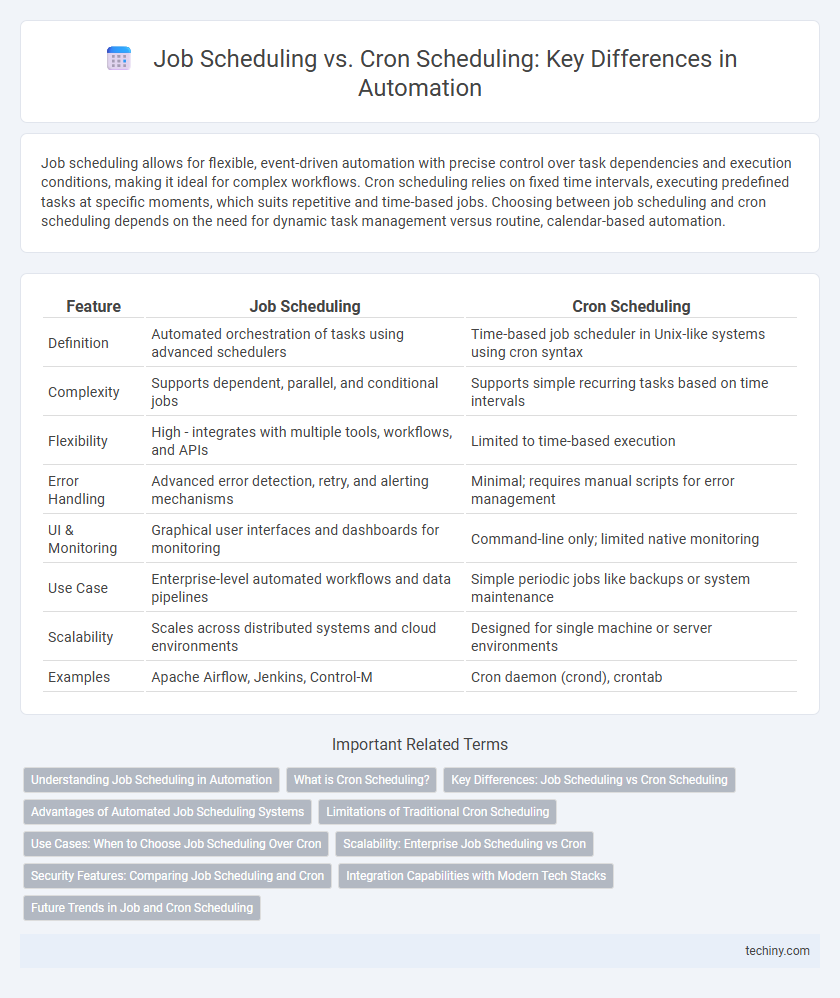Job scheduling allows for flexible, event-driven automation with precise control over task dependencies and execution conditions, making it ideal for complex workflows. Cron scheduling relies on fixed time intervals, executing predefined tasks at specific moments, which suits repetitive and time-based jobs. Choosing between job scheduling and cron scheduling depends on the need for dynamic task management versus routine, calendar-based automation.
Table of Comparison
| Feature | Job Scheduling | Cron Scheduling |
|---|---|---|
| Definition | Automated orchestration of tasks using advanced schedulers | Time-based job scheduler in Unix-like systems using cron syntax |
| Complexity | Supports dependent, parallel, and conditional jobs | Supports simple recurring tasks based on time intervals |
| Flexibility | High - integrates with multiple tools, workflows, and APIs | Limited to time-based execution |
| Error Handling | Advanced error detection, retry, and alerting mechanisms | Minimal; requires manual scripts for error management |
| UI & Monitoring | Graphical user interfaces and dashboards for monitoring | Command-line only; limited native monitoring |
| Use Case | Enterprise-level automated workflows and data pipelines | Simple periodic jobs like backups or system maintenance |
| Scalability | Scales across distributed systems and cloud environments | Designed for single machine or server environments |
| Examples | Apache Airflow, Jenkins, Control-M | Cron daemon (crond), crontab |
Understanding Job Scheduling in Automation
Job scheduling in automation refers to the process of defining, managing, and executing tasks or workflows at specific times or intervals within an automated system. Unlike basic cron scheduling, which primarily triggers commands based on time syntax, job scheduling platforms offer enhanced features such as dependencies, error handling, retries, and complex workflow orchestration. Leveraging job scheduling tools like Apache Airflow or Jenkins enables businesses to streamline operations, increase reliability, and optimize resource utilization in automated environments.
What is Cron Scheduling?
Cron scheduling is a time-based job scheduler in Unix-like operating systems that automates task execution at specified intervals using cron expressions. It enables precise scheduling of scripts, commands, or programs to run repeatedly or at fixed times without manual intervention. Cron improves automation efficiency by managing repetitive tasks such as backups, data processing, and system maintenance.
Key Differences: Job Scheduling vs Cron Scheduling
Job scheduling refers to the automated process of managing and executing tasks or workflows across various systems using advanced scheduling tools, often supporting dependencies, complex time intervals, and event-based triggers. Cron scheduling specifically utilizes cron expressions to run tasks on Unix-based systems at fixed times or recurring intervals, making it ideal for simple, repetitive jobs. Key differences include job scheduling's support for multi-system integration and sophisticated workflows compared to cron's focus on straightforward time-based task execution.
Advantages of Automated Job Scheduling Systems
Automated job scheduling systems offer enhanced flexibility and scalability compared to traditional cron scheduling by allowing dynamic workflows and dependencies across distributed environments. These systems provide centralized management, real-time monitoring, and error handling capabilities that improve operational efficiency and reduce manual intervention. Integration with enterprise applications and cloud platforms enables seamless automation of complex business processes, driving higher productivity and reliability.
Limitations of Traditional Cron Scheduling
Traditional cron scheduling struggles with limited flexibility, as it only supports fixed time intervals for job execution, making dynamic or event-based scheduling difficult. It lacks advanced error handling and dependency management, causing potential job failures without automated retries or notifications. Scalability issues arise in distributed systems where cron jobs cannot easily coordinate across multiple servers, hindering efficient resource utilization.
Use Cases: When to Choose Job Scheduling Over Cron
Job scheduling is ideal for complex workflows requiring dependency management, error handling, and centralized control, unlike cron scheduling which suits simple, repetitive tasks on Unix-like systems. Enterprises with diverse job types across multiple servers benefit from job scheduling tools like Apache Airflow or Control-M, ensuring scalability and monitoring capabilities. Use job scheduling over cron when tasks demand advanced coordination, dynamic execution times, and integration with other enterprise systems for robust automation.
Scalability: Enterprise Job Scheduling vs Cron
Enterprise job scheduling offers superior scalability compared to cron scheduling by supporting complex workflows, distributed systems, and high-volume task orchestration across multiple servers. Unlike cron, which is limited to single-node scheduling and simple repetitive tasks, enterprise schedulers provide centralized control, error handling, and load balancing critical for large-scale environments. This scalability ensures reliable automation in dynamic infrastructures, making enterprise solutions ideal for growing organizations with diverse automation needs.
Security Features: Comparing Job Scheduling and Cron
Job scheduling systems often include advanced security features such as role-based access control, encrypted job definitions, and audit logging to ensure secure and compliant task execution. In contrast, traditional cron scheduling is limited in security capabilities, primarily relying on OS-level permissions without built-in encryption or detailed audit trails. Enterprises seeking robust security in automation frequently prefer job schedulers that provide granular access management and comprehensive monitoring over standard cron implementations.
Integration Capabilities with Modern Tech Stacks
Job scheduling systems offer broad integration capabilities with modern tech stacks through REST APIs, webhook triggers, and native connectors to cloud platforms like AWS, Azure, and Google Cloud. Cron scheduling provides basic time-based task execution, but lacks the advanced integration features required for seamless interaction with container orchestration tools like Kubernetes or CI/CD pipelines. Enterprises leverage job schedulers for orchestrating complex workflows across microservices, databases, and serverless environments, enhancing automation efficiency beyond traditional cron jobs.
Future Trends in Job and Cron Scheduling
Future trends in job scheduling and cron scheduling emphasize enhanced automation through AI-driven predictive analytics that optimize job timing and resource allocation. The integration of cloud-native solutions promotes scalability and resilience, enabling dynamic scheduling across distributed systems. Advanced security measures and real-time monitoring capabilities further elevate the reliability and compliance of automated scheduling in enterprise environments.
Job Scheduling vs Cron Scheduling Infographic

 techiny.com
techiny.com